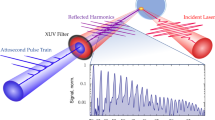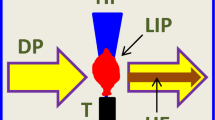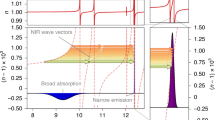Abstract
EARLY forms of the arc harmonic generator have already been described1–3. The basis of these was a ‘cold cathode’ arc running between a mercury (or calcium) cathode and a tungsten wire anode in argon gas at high pressure. The arc was maintained by the combined action of a direct current field and a microwave field, the rectifying action of the arc ‘cathode spot’ producing harmonics of the microwave drive.
This is a preview of subscription content, access via your institution
Access options
Subscribe to this journal
Receive 51 print issues and online access
$199.00 per year
only $3.90 per issue
Buy this article
- Purchase on Springer Link
- Instant access to full article PDF
Prices may be subject to local taxes which are calculated during checkout
Similar content being viewed by others
References
Froome, K. D., Nature, 184, 808 (1959).
Froome, K. D., Nature, 186, 959 (1960).
Froome, K. D., Nature, 188, 43 (1960).
Author information
Authors and Affiliations
Rights and permissions
About this article
Cite this article
FROOME, K. Microwave Harmonic Generator capable of Frequencies in Excess of 600 Gc./s.. Nature 193, 1169–1170 (1962). https://doi.org/10.1038/1931169b0
Issue Date:
DOI: https://doi.org/10.1038/1931169b0
Comments
By submitting a comment you agree to abide by our Terms and Community Guidelines. If you find something abusive or that does not comply with our terms or guidelines please flag it as inappropriate.



